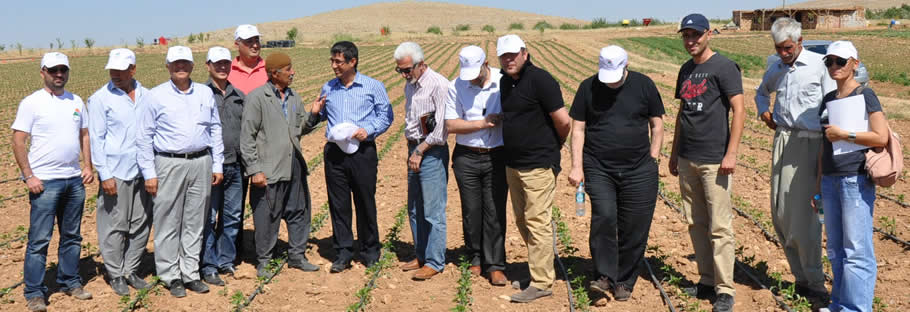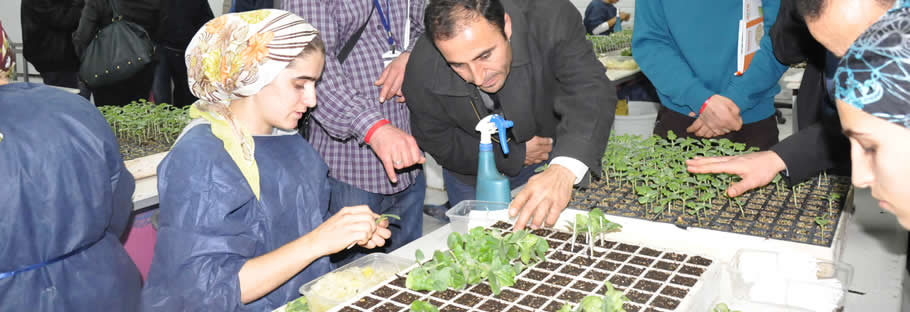As it is known, by the implementation of major irrigation projects in GAP area in the 1990s, the importance of agricultural extension service training has improved. The reason is that, the most significant criterion that affects the feasibility of irrigation investments of people who will use these facilities, in other words the expected level of social and economic development of the farmers. The most important of the main reasons for this situation is with respect to irrigated agriculture and agricultural irrigation, extension works of agricultural training has always remained in the background. Therefore, the benefits to be provided for the regional and national economy could not reach the desired levels due to the lack of knowledge and experience of farmers in evaluating the huge costs of irrigation investments. Socio-cultural structure composes other factors related to physical infrastructure problems and regulations with their implementation. In 2008, with the declaration of the GAP Action Plan, and with a significant momentum of irrigation investments in the region, the importance of these issues increased significantly while performance of a special study regarding especially informing farmers and raising awareness, became mandatory to prevent recurrence of bad examples from the past.
GAP BKI has conducted several studies to this day about the extension of agricultural training in the region inspired by agricultural researches that were made in the area, agricultural projects that were conducted, the coordination meetings with institutions and organizations, and the experience gained for years. One of them is the extension of training’s feasibility report prepared by faculty members from the Department of Agricultural Economics at Çukurova and Akdeniz Universities under the chairmanship of Harran University’s Faculty of Agriculture and the Department of Agricultural Economics. GAP Agricultural Training and Extension Project (GAP-TEYAP) was implemented under the coordination of GAP Regional Development Administration in 2011 by means of creating solutions to all these problems and to use the potential of the region actively in order to ensure sustainable agricultural development.
With GAP TEYAP, increasing of the effectiveness of agricultural training and extension services in areas opened and to-be-opened for irrigation and primarily including farmer’s organizations serving in this regard, much has been contributed to increasing the capacity of institutions and organizations.

For this purpose; project focuses on two main issues. The first of these is the need for improving the efficiency of agricultural training and extension services. And the other is to determine the sustainable agricultural extension and advisory model/models suitable for the area and work with the principle of self-help. By taking into consideration the project’s budget and time, meeting the deficit of services completely with such a project is not foreseen with respect to agricultural extension and consultancy services. The project has undertaken the task of demonstrating how to settle deficiencies identified to be met with model/models to be developed.
Between April 2011 and December 2013, within the scope of GAP TEYAP, project activities, including capacity building works of the technical staff who study the extension of agricultural training;
Component 1. Improving the capacity of relevant institutions and organizations that provide these services in agricultural extension and consultancy services.
Component 2. Increasing the capacity of farmers and farmers’ organizations.
Component 3. Ensuring coordination between organizations and institutions in terms of agricultural extension and consultancy services and raising awareness.
Component 4. Development of a sustainable agricultural training and extension model/models which operate with the principle self-aid in the region of GAP.
Model development stages which were formed by titles of subjects and carried out within the development plan, were completed with the demonstration of how to meet the deficit of services, coordination and cooperation. From experiences gained to this day, during the project implementation period and in the fields of training and extension experiences with GAP TEYAP; the implementation of the following activities under effective, a sustainable model of agricultural training and model of extension development are planned. Studies related with subject by GAP BKI, from conducted workshops and the results obtained in other studies conducted with the participation of all relevant stakeholders and with taking into account the current conditions needs to be done and developments in this field.
In the region, to work with self-help principle, based on farmers’ organizations, pluralistic and demand-driven, effective in solving the problems of an extension model, and it was decided that it would be appropriate. For this purpose, taking into account the contribution of all relevant institutions and organizations and the results of the studies, Farmers’ Organizations Centred Pluralistic Extension Model has been improved and implemented.


